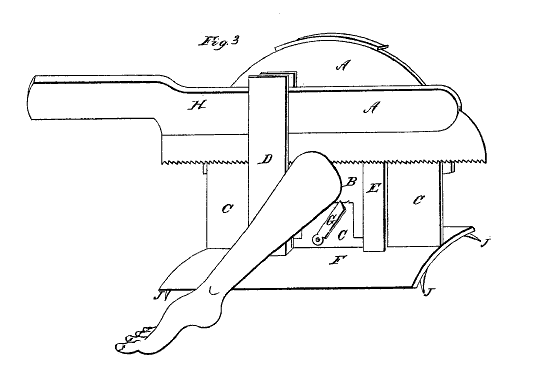
— William T. Dobson, Literary Frivolities, Fancies, Follies and Frolics, 1880

— William T. Dobson, Literary Frivolities, Fancies, Follies and Frolics, 1880

In 1688, John Locke received a letter from scientist William Molyneaux posing a curious philosophical riddle: Suppose a blind man learned to identify a cube and a sphere by touch. If the shapes were then laid before him and his vision restored, could he identify them by sight alone?
Locke responded, “Your ingenious problem will deserve to be published to the world,” and he included a formulation of the problem in the second edition of the Essay Concerning Human Understanding.
Three hundred years later, it’s still an open question. (Locke agreed with Molyneaux that the answer is probably no: “The blind man, at first sight, would not be able with certainty to say which was the globe, which the cube, whilst he only saw them; though he could unerringly name them by his touch, and certainly distinguish them by the difference of their figures felt.”)
semiopathy
n. the tendency to read humorously inappropriate meanings into signs
CROSS CHILDREN WALK. Don’t listen to their screams,
But watch the CAUTION MEN AT WORK. It seems
They’re making sure that all DEAF CHILDREN DRIVE
CAREFULLY. Now let us look alive,
And take TRUCKS TURNING (named for Captain Trucks,
Who turned here when he went out hunting ducks).
Here on a sign the advertising’s clear
(Though deer can’t tell the time) for WATCH FOR DEER.
At FREE MUNICIPAL PARKING let us pause,
And wonder who enslaved it, for what cause.
A DANGEROU is what we’ll hope to see:
DANGEROUS CROSSINGs certainly abound.
Now will they leap across from tree to tree,
Or buck the passing traffic on the ground?
— Ralph P. Boas Jr.
Entering the lonely house with my wife
I saw him for the first time
Peering furtively from behind a bush –
Blackness that moved,
A shape amid the shadows,
A momentary glimpse of gleaming eyes
Revealed in the ragged moon.
A closer look (he seemed to turn) might have
Put him to flight forever –
I dared not
(For reasons that I failed to understand),
Though I knew I should act at once.
I puzzled over it, hiding alone,
Watching the woman as she neared the gate.
He came, and I saw him crouching
Night after night.
Night after night
He came, and I saw him crouching,
Watching the woman as she neared the gate.
I puzzled over it, hiding alone –
Though I knew I should act at once,
For reasons that I failed to understand
I dared not
Put him to flight forever.
A closer look (he seemed to turn) might have
Revealed in the ragged moon
A momentary glimpse of gleaming eyes
A shape amid the shadows,
Blackness that moved.
Peering furtively from behind a bush,
I saw him, for the first time,
Entering the lonely house with my wife.
— J.A. Lindon

In the 19th century manuals such as Gunn’s Domestic Medicine promised that “any man, unless he be an idiot or an absolute fool,” could perform an amputation. But Pennsylvania surgeon George Griswold had found that “persons unskilful in the use of the saw, and even the most experienced, will find it difficult to hold the bone firmly,” increasing both the patient’s pain and length of the operation. He invented this “amputator’s assistant” to hold a limb steady while a surgeon saws through it.
He patented it in 1854, only seven years before the Civil War. I haven’t been able to learn how widely it was used.
In making up newspapers–that is, in piecing together paragraphs into columns–two separate items may sometimes be jumbled together with amazing results. Thus, the New Haven Journal announced in one paragraph that ‘The large cast-iron wheel, revolving nine hundred times a minute, exploded in that city yesterday after a long and painful illness. Deceased was a prominent thirty-second degree Mason,’ and in another that ‘John Fadden, a well-known florist and real-estate broker of Newport, Rhode Island, died in Wardner Russell’s sugar-mill at Crystal Lake, Illinois, on Saturday, doing $3000 damages to the building and injuring several workmen severely.’
— William Shepard Walsh, Handy-Book of Literary Curiosities, 1892
Love is a verb.
In that sentence, is love a noun or a verb?

When I think of a unicorn, what I am thinking of is certainly not nothing; if it were nothing, then, when I think of a griffin, I should also be thinking of nothing, and there would be no difference between thinking of a griffin and thinking of a unicorn. But there certainly is a difference; and what can the difference be except that in the one case what I am thinking of is a unicorn, and in the other a griffin? And if the unicorn is what I am thinking of, then there certainly must be a unicorn, in spite of the fact that unicorns are unreal. In other words, though in one sense of the words there certainly are no unicorns–that sense, namely, in which to assert that there are would be equivalent to asserting that unicorns are real–yet there must be some other sense in which there are such things; since, if there were not, we could not think of them.
— G.E. Moore, Philosophical Studies, 1922
Pronouns refer to nouns. In the sentence Francis touched the beggar and cured him, we can “unpack” the pronoun him by replacing it with its referent, the beggar: Francis touched the beggar and cured the beggar.
But what if a sentence has two phrases that refer to each other? The pilot that shot at it hit the Mig that chased him. Now there’s an infinite regress:
The pilot that shot at the Mig that chased the pilot that shot at it hit the Mig that chased the pilot that shot at it.
It seems that no amount of unpacking can resolve these pronouns. Yet most readers can understand the sentence immediately. How are they able to do so?